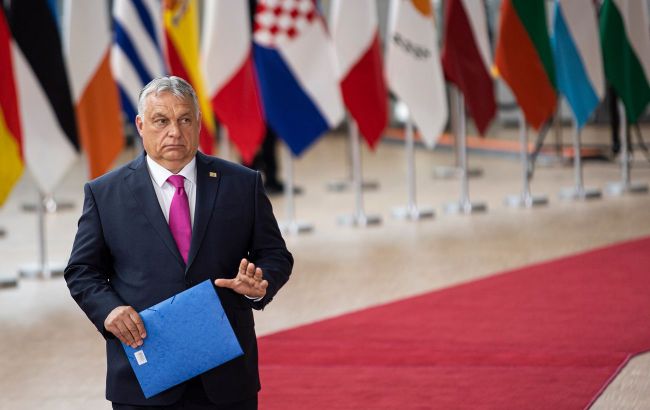Viktor Orban: Hungarian Prime Minister criticizing Ukraine, allying with Putin
 Hungarian Prime Minister Viktor Orban (photo: Getty Images)
Hungarian Prime Minister Viktor Orban (photo: Getty Images)
During his long political career, Viktor Orban has gone from being a convinced anti-Soviet and Russophobe, and later a supporter of Ukraine's Euro-Atlantic integration, to the Kremlin's main ally in the European Union and NATO, who personally meets with Putin and is even "proud" of it. And at the same time, he is trying to undermine the EU from within and block Ukraine's accession.
Read about how Viktor Orban went from criticizing Russia to partnering with Putin, conflict with the whole of Europe, and thinking about the "purity of the race" in the RBC-Ukraine article.
The material was prepared based on public statements by Viktor Orban, and materials from BBC, Telex, and Guardian.
Anti-Soviet and Russophobe
Orban came to Hungarian politics in the late 1980s, during the collapse of the communist bloc in Eastern Europe, actively advocated the withdrawal of Soviet troops from the country, and recalled Moscow's bloody suppression of the 1956 Hungarian uprising.
When he first became the country's prime minister in 1998, he not only did not maintain political contacts with Russia but also prevented Russian economic expansion into Hungary. The BBC called him "the most anti-Russian politician in Central Europe."
In 2002, Orban found himself in the opposition, and his political platform was increasingly shifting toward national conservatism and populism. However, after Russia's aggression against Georgia in 2008, Orban publicly called for Ukraine and Georgia's early admission to NATO.
The following year, he attended the congress of the ruling United Russia party, reoriented from the West to the East, and increasingly criticized European liberal democracy. In 2010, his Fidesz party won the elections, and Orban returned to the prime minister's chair, which he has retained to this day.
The language issue
In Ukraine, the general public first paid serious attention to Orban in 2014, shortly after the first wave of Russian aggression began. At that time, the Hungarian prime minister came up with the idea of granting autonomy to the Hungarians of Zakarpattia.
Since then, the issue of the Hungarian minority in Zakarpattia has become Orban's main tool in Ukraine. It has become particularly acute since 2017 when the Verkhovna Rada passed a new law on education aimed at strengthening the position of the Ukrainian language. Since then, the Hungarian authorities have been systematically hindering Ukraine's integration into the European Union and NATO, using the principle of consensus decision-making in these organizations.
Kyiv's repeated attempts to seek a compromise with Budapest on national and language issues have been ultimately thwarted by the Hungarian side. However, as the events of the last few days have shown, the "protection of the Hungarians of Zakarpattia" was more of a pretext for Orban's anti-Ukrainian policy than a reason.
After all, even the adoption of a new law on national minorities by the Rada, approved by the European Union, and a public appeal by the Hungarians Zakarpattia themselves calling for not interfering with Ukraine's European integration did not change his rhetoric. Having forgotten about "protecting the Hungarians of Zakarpattia," Orban is now speculating on corruption in Ukraine, the Russian-Ukrainian war (which, in his opinion, Ukraine will never win), and so on.
The road to authoritarianism
During Orban's second term as Prime Minister, Hungary has been systematically degrading in terms of democracy, and many observers believe it has already slipped into de facto authoritarianism. In September last year, the European Parliament called on the European Commission to impose sanctions against Hungary for curtailing democratic freedoms, including freedom of speech, restrictions on minority rights, loss of judicial independence, etc.
Because of problems with the rule of law and human rights, Brussels regularly blocks multibillion-dollar payments to Hungary from the European budget, and this issue is a topic of constant bargaining between Orban and European officials, including over Ukraine.
Orban's agreement not to block the opening of negotiations on Ukraine's accession to the EU is directly linked to the unfreezing of 10 billion euros for Budapest.
In domestic politics, Orban systematically promotes an ultra-conservative agenda in Hungary, positioning migrants and the LGBT community as enemies of his nation. At times, he allows himself to make statements that are only voiced by marginalized far-right politicians in Europe, not by leaders of states.
Last summer, for example, his speech about "mixing European and non-European races" caused a major scandal, in which he emphasized that Hungary, unlike other countries on the continent, maintains "racial purity."
Searching for friends
In his chronic confrontation with Brussels, Orban is desperately looking for allies among Europe's right-wing and far-right parties. For a long time, his key partner was Law and Justice, which ruled in Poland and was accused by the EU of similar authoritarian tendencies, infringement of human rights, freedom of speech independence of the judiciary, etc.
But Russia's full-scale aggression against Ukraine put Budapest and Warsaw at odds. Law and Justice leader Jaroslaw Kaczynski explicitly stated that his country would not cooperate with Orban because of the latter's anti-Ukrainian stance. For a similar reason, Orban's relations with Italian Prime Minister Giorgia Meloni, who has also taken a radically pro-Ukrainian stance, have deteriorated.
Orban's only recent success is the rise to power in Slovakia of populists led by Robert Fico. But he is even more of an opportunist than Orban himself, and he is not ready for a large-scale open conflict with Brussels.
In such a situation, Vladimir Putin turned out to be Orban's natural ally. Their positions coincide on many issues, from conservative populist rhetoric, hatred of "liberal democracy", disregard for human rights, and the war in Ukraine. Orban is constantly voicing narratives that are most favorable to the Kremlin, the key one being that the West's support for Ukraine is pointless and should be stopped. There is also a purely economic factor: Hungary receives energy supplies from Russia at a discount, and the Russians will build the Paks-2 nuclear power plant in the country.
Another explanation for Orbán's sharp turn toward Moscow in the late 2000s is circulating in Hungarian circles: that he had simply received a suitcase of money from the Kremlin. But no one has yet provided any real evidence for this version.
Yesterday, the European Council decided to start negotiations on Ukraine's accession to the EU.
Despite fears, Viktor Orban did not block this decision. According to European media reports, German Chancellor Olaf Scholz asked him to leave the room during the vote, which resulted in a unanimous decision on Ukraine.
For more details on what lies ahead for Ukraine on its way to the EU, read RBC-Ukraine's article.

